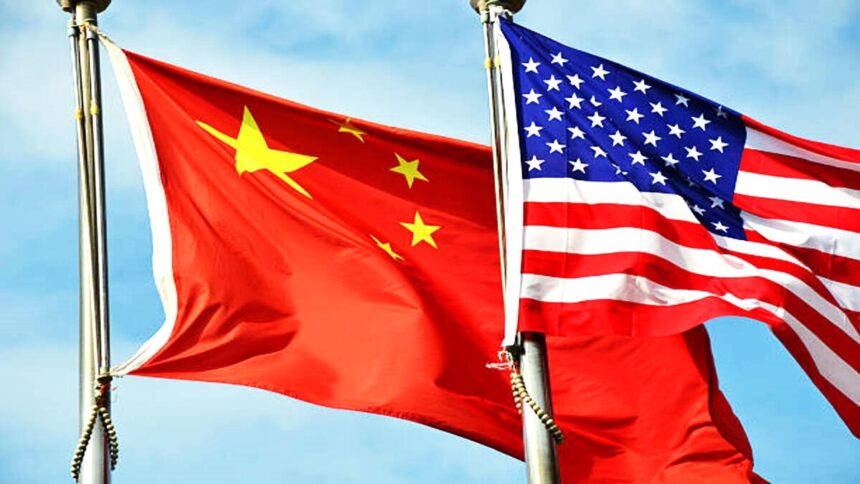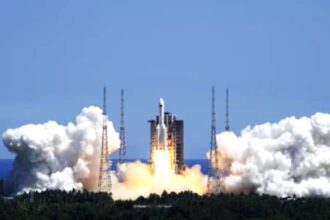China has issued a strong warning to the United States, condemning its latest military assistance to Taiwan and accusing Washington of “playing with fire.” This latest tension comes on the heels of President Joe Biden’s approval of significant military aid and sales to the self-ruled island of Taiwan, which China considers part of its territory. Beijing views these actions as a provocation and a violation of its sovereignty, further escalating the already strained relations between the two powers.
Latest US Military Assistance to Taiwan
On Saturday, President Biden authorized up to $571 million in U.S. Defense Department material and services, alongside military training and education for Taiwan. This announcement came on the heels of a similar decision in late September, when Biden approved another $567 million in military assistance for the island. Additionally, the U.S. Defense Department revealed Friday that $295 million worth of military sales to Taiwan had been approved.
This substantial military assistance aims to help Taiwan bolster its defense capabilities and deter any potential aggression from China. Among the items included in the latest package are $265 million worth of tactical radio systems and $30 million for gun mounts. This marks the third such military aid package approved by the Biden administration in 2024 alone, following earlier approvals for advanced missile systems and air defense equipment.
China’s Strong Reaction
China quickly expressed its discontent with the U.S. military support for Taiwan. The Chinese government, through its Foreign Ministry, condemned the latest arms sales and military aid, describing them as a breach of the “One China” principle. This principle asserts that Taiwan is an inseparable part of China, and Beijing has long demanded that the island be reunified with the mainland, by force if necessary.
A Chinese Foreign Ministry spokesperson warned that the U.S. was “playing with fire” by providing arms to Taiwan, arguing that it risks inciting severe consequences. The statement emphasized that the U.S. was undermining peace and stability in the Taiwan Strait, a vital waterway for international shipping and trade. The Chinese government also accused the U.S. of violating commitments made by past administrations not to support Taiwan’s independence, warning that such actions send the wrong message to “separatist forces” on the island.
In a pointed remark, the Chinese spokesperson stressed that the U.S. was “exploiting the Taiwan question” as a means to contain China, a strategy they believe is doomed to fail. Beijing has repeatedly warned Washington to stop arming Taiwan and to cease actions that might escalate tensions in the region.
The Chinese government continues to claim Taiwan as its territory and says it must come under its control. https://t.co/eGLcgSZdc4
— Military Times (@MilitaryTimes) December 22, 2024Taiwan’s Response
Taiwan, for its part, welcomed the approval of the latest military aid packages, viewing them as a reaffirmation of the U.S. government’s commitment to defending the island. In a statement on the social media platform X (formerly Twitter), Taiwan’s Foreign Ministry thanked the U.S. for its continued support, highlighting the importance of military assistance in strengthening Taiwan’s defense capabilities in the face of mounting threats from China.
Taiwan has long maintained that it does not seek to provoke China but rather aims to protect itself from potential aggression. The island spends about 2.5% of its GDP on defense, and military experts argue that strengthening Taiwan’s defenses is vital for regional stability, given the growing pressure from China.
The Broader Context: US-China Tensions
The recent military assistance is part of a broader context of escalating tensions between the U.S. and China over Taiwan. In October, the U.S. approved a $2 billion arms sale to Taiwan, which included advanced surface-to-air missile defense systems for the first time. This move was met with outrage in Beijing, which responded by conducting military drills near Taiwan. These drills were seen as both a demonstration of force and a warning to Taiwan’s leadership not to pursue further moves toward independence.
China’s response to the U.S. military aid has also been accompanied by sanctions against Western arms manufacturers. Earlier this year, China imposed sanctions on five major defense companies from the U.S. and other Western countries after a previous round of arms sales to Taiwan. These actions are part of China’s broader strategy to exert pressure on any foreign entities that engage in military sales to Taiwan.
The ongoing tensions have sparked concerns about the possibility of a conflict in the Taiwan Strait. Chinese President Xi Jinping has repeatedly vowed to unify Taiwan with the mainland, and he has not ruled out the use of force to achieve this goal. Meanwhile, the U.S. has continued to pledge support for Taiwan, though President-elect Donald Trump has raised questions about America’s commitment to defending the island in the event of a Chinese invasion, saying Taiwan should bear some of the financial burden for its defense.
The Economic and Strategic Stakes
The strategic and economic stakes in the Taiwan Strait are immense. Taiwan is a critical player in global supply chains, particularly in the semiconductor industry, and its location in the Asia-Pacific makes it a flashpoint in U.S.-China relations. The U.S. has maintained a policy of strategic ambiguity regarding Taiwan, meaning it has not explicitly committed to defending the island but has provided arms and diplomatic support to help Taiwan defend itself.
The Taiwan issue has become a central element in the U.S.-China rivalry, with both countries using it to assert their influence in the region. For the U.S., supporting Taiwan is part of a broader strategy to counter China’s growing military and economic power, while for China, reclaiming Taiwan is seen as a vital component of its national sovereignty and territorial integrity.
The Path Ahead: Uncertainty and Risk
As tensions continue to rise, the path forward remains uncertain. While the U.S. is committed to helping Taiwan defend itself, Beijing’s actions in response to military aid and arms sales indicate that the situation is far from stable. China has shown no signs of backing down on its stance toward Taiwan, and its military activities near the island continue to escalate.
For Taiwan, the stakes are high. The island faces increasing pressure from China, which has ramped up military drills and diplomatic efforts to isolate Taiwan internationally. Taiwan’s government, meanwhile, continues to seek ways to strengthen its defenses while avoiding direct confrontation with China.
As the U.S. and China navigate this delicate and potentially volatile situation, the future of Taiwan remains one of the most pressing issues in global geopolitics. Both countries appear committed to their positions, but with the risks of military conflict growing, the world watches closely to see how this standoff will evolve in the coming months and years.
Read More : Senate Approves Social Security Fairness Act to Boost Benefits for Public Sector Workers






